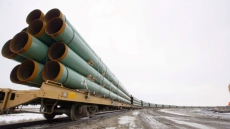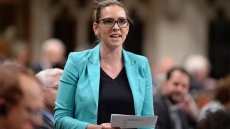OTTAWA — There's a Punjabi phrase shouted to give thanks for victories: the truth will always prevail.
So as Prime Minister Justin Trudeau concluded his formal apology Wednesday for the Komagata Maru incident of 1914, Amarjeet Singh Sidhu, who had travelled from outside Toronto to watch the event, could not restrain himself.
With a turban proudly on his head and a chest full of medals for his Canadian community service, he rose to his feet in the public gallery of the House of Commons and shouted the phrase for all to hear.
And the hundreds of Indo-Canadians in attendance Wednesday for the historic moment roared back their thanks in union.
"This is a country for people who bring prosperity to be part of the mainstream, work together, play together, pray together," Sidhu said afterwards.
It wasn't always that way.
In 1914, the Canadian government turned away most of the passengers of the Japanese steamship Komagata Maru, nearly all Sikhs, who'd hoped to start a new life in Canada.
The 376 passengers arrived off the coast of B.C. hoping to challenge the immigration laws at the time which refused entry to any Indians who had not arrived in Canada via a continuous journey from the home country — nearly impossible at the time.

Except for 20 passengers who had previously lived in Canada, officials refused to allow the Indians in, even though they were British subjects just like every other Canadian of the time.
The vessel sailed to India, where 19 of the passengers were killed in a skirmish with British authorities and dozens of others were imprisoned or forced into hiding.
"Canada cannot solely be blamed for every tragic mistake that occurred with the Komagata Maru and its passengers," Trudeau told the House, which was packed with MPs and onlookers, many of whom had travelled from across the country.
"But Canada's government was, without question, responsible for the laws that prevented these passengers from immigrating peacefully and securely. For that, and for every regrettable consequence that followed, we are sorry."
Trudeau's formal apology is the second from a Canadian prime minister. Former prime minister Stephen Harper delivered an apology in 2008 in British Columbia, not the House of Commons.

His words were part of a broader effort by the previous government to acknowledge the harsh treatment of Indians in the early years of the 20th century, said Opposition leader Rona Ambrose.
"We can't change the past," she said. "But we can demonstrate that Canada has changed."
That was true for Gurjinder Kaur Gill, who travelled from Montreal for the event and stood with dozens of people afterwards at a small reception, hoping for a chance to meet Trudeau.
Only 24, she said it was important for her to be part of acknowledging a moment in time that while she never experienced, so many in her community had been touched by the legacy of the ship and the laws of the day.
"It's like closure," she said.
"It shows that Canada is inclusive to everyone."
For B.C. Sikhs, the Komagata Maru incident was a pivotal moment. Many members of the community — whose numbers had been dwindling in part due to the discriminatory immigration laws of the day — raised thousands of dollars to support legal challenges for the people stuck on the boat.

Today, there are over 200,000 Sikhs in the province and for all them, Wednesday was an exceptionally proud moment, said Harwinder Pal Singh, the high president of Vancouver's Khalsa Diwan Society, the oldest Sikh society in the country.
He said there is a lesson in the experience of the Komagata Maru he hopes not just the government, but all Canadians, take to heart.
"We should welcome everybody who is in need and who is dreaming of a better future."


